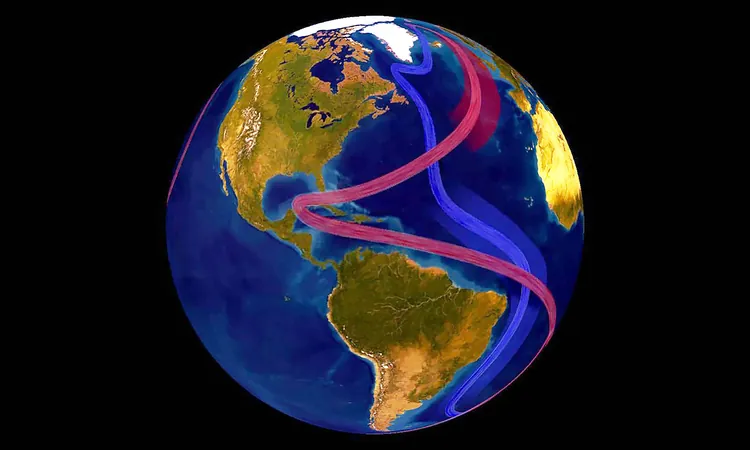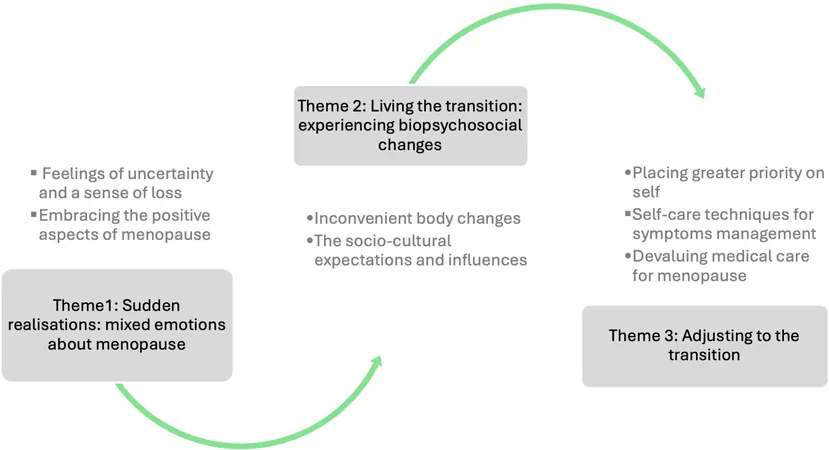
Shocking Evidence: The Collapse of Earth’s Ocean Currents is Happening Right Now!
2024-11-25
Author: Wei
Have you ever dipped your toes in the ocean and felt the currents? What you may not realize is that these currents are part of an enormous, intricate system known as the “great global ocean conveyor belt,” which plays a pivotal role in regulating the Earth's climate by moving water around the globe.
Recent studies reveal a startling fact: this crucial ocean circulation system is weakening—fast. According to groundbreaking research published in **Nature Geoscience**, we are edging closer to the brink of a total collapse of these ocean currents, and the implications could be catastrophic.
Understanding Ocean Circulation and the AMOC
At the heart of this global system is the Atlantic Meridional Overturning Circulation (AMOC), often described as a giant conveyor belt. It begins in the warm waters of the Gulf of Mexico, where salty water flows northward along the U.S. eastern coast and across the Atlantic to Europe. As this warm water travels north, it cools, becomes denser, and sinks into deeper waters. This movement pulls additional warm water from the tropics, maintaining a continuous cycle that significantly influences climate and weather patterns.
Regions like Western Europe benefit from the AMOC's warmth, enjoying milder winters than they would otherwise experience. However, recent findings indicate that this critical system is now weaker than it has been in over 1,000 years, thanks to global warming and the ensuing climatic changes.
What's Behind the Changes?
Researchers are increasingly linking the slowdown of the AMOC to the melting of the Greenland ice sheet and glaciers in Canada. As Arctic temperatures rise—nearly four times faster than the global average—vast amounts of fresh water pour into the Atlantic. This influx hampers the natural sinking of denser, saltier water, thus disrupting the entire conveyance process.
According to the research team, a mere 2°C increase in global temperatures could cause the AMOC to become over one-third weaker than it was just 70 years ago. This drastic change threatens to alter climate conditions and ecosystems globally, leading to harsher winters in Europe, increased warming in the southern hemisphere, and drastic shifts in monsoon patterns affecting millions of people.
The Ripple Effects of a Weaker Gulf Stream
The implications of a slowed Gulf Stream are sobering. For instance, Europe might experience winter conditions akin to parts of Canada, dramatically changing the lives of millions. Research shows that this slowdown has continued since the mid-20th century, indicating a trend that’s not only alarming but also accelerating.
Furthermore, scientists have discovered amplified connections between the northern and southern Atlantic oceans, whereby changes in one region can rapidly influence distant areas. A strong ocean current typically transfers substantial heat to the North Atlantic; however, a weakened current leads to a significant “warming hole” south of Greenland, while the South Atlantic increasingly retains heat and salt.
Act Fast: Time is Running Out!
The urgency of the situation cannot be overstated. Projections suggest a staggering 30% weakening of the AMOC by 2060—but that could happen as soon as 2040 if current trends continue. The Greenland ice sheet is poised to continue its melt, potentially raising global sea levels by at least 4 inches over the coming century, and exacerbating the chills of a changing climate.
We need to ask ourselves: What can we do? Researchers warn that the rapid decline of ocean currents will disrupt weather patterns and ecological balances across continents. Colder European winters, drier conditions in northern tropics, and increasingly wet summers in the southern United States are just the beginning.
Every minute counts as we confront these shocking realities. The interconnectedness of our planet's systems necessitates immediate action to reduce emissions and combat climate change. To avert disaster and protect future generations, we must commit to making a difference—now.
Stay informed and engaged; our planet's future depends on it.
If you found this article enlightening, be sure to subscribe to our newsletter for the latest news and updates on climate science and environmental issues!





 Brasil (PT)
Brasil (PT)
 Canada (EN)
Canada (EN)
 Chile (ES)
Chile (ES)
 España (ES)
España (ES)
 France (FR)
France (FR)
 Hong Kong (EN)
Hong Kong (EN)
 Italia (IT)
Italia (IT)
 日本 (JA)
日本 (JA)
 Magyarország (HU)
Magyarország (HU)
 Norge (NO)
Norge (NO)
 Polska (PL)
Polska (PL)
 Schweiz (DE)
Schweiz (DE)
 Singapore (EN)
Singapore (EN)
 Sverige (SV)
Sverige (SV)
 Suomi (FI)
Suomi (FI)
 Türkiye (TR)
Türkiye (TR)